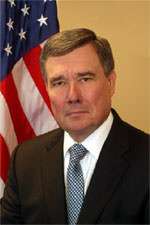Outgoing Drug Czar Gil Kerlikowske's Greatest Hits

Last week President Obama nominated Gil Kerlikowske, his drug czar since 2009, to head U.S. Customs and Border Protection. The move is fitting for Kerlikowske, a former Seattle police chief who declared an end to the war on drugs when he took over the Office of National Drug Control Policy and then (like his boss) carried on pretty much as before. In his new post as customs commissioner, Kerlikowske will be charged with standing between Americans and the psychoactive substances they want—an absurd, futile task that's perfect for the unreconstructed drug warrior he was quickly revealed to be.
The Seattle Post-Intelligencer gives Kerlikowske credit for being less bellicose than his predecessor, John Walters, and for not campaigning against marijuana legalization in Colorado and Washington last year. But Kerlikowske did publicly oppose Proposition 19, California's 2010 legalization initiative, and after the 2012 initiatives passed he emphasized that marijuana prohibition will be enforced even in states that are trying to opt out. His rhetorical record during the last four years includes lots of lip service to science and "public health," interspersed with the sort of ill-informed, buffoonish pronouncements we have come to expect from our drug czars:
June 2009: "Marijuana is dangerous and has no medicinal benefit."
July 2009: "Legalization is not in the president's vocabulary, and it's not in mine."
August 2009: "We had been hiking in 107-degree weather in the Sierra Nevadas, and when we came down, the question was in reference to smoked marijuana, and as you know, smoked marijuana has not been shown by the FDA to have, to show, medicinal value. This is a medical question, and that's where we're going to leave it."
August 2010: "It is our experience that an overwhelming majority of police professionals does not support legalizing marijuana….Our opposition to legalizing marijuana is grounded not in ideology but in facts and experience."
September 2010: "I think all of the attention and the focus of calling marijuana medicine has sent the absolute wrong message to our young people."
October 2010: While jumping in from Washington and telling Californians how to vote on Proposition 19, Kerlikowske declares, "People don't want to see someone jump in from Washington and tell them how to vote."
December 2010: "We have been telling young people, particularly for the past couple years, that marijuana is medicine. So it shouldn't be a great surprise to us that young people are now misperceiving the dangers or the risks around marijuana."
December 2010: Kerlikowske identifies "'Just Say No' under Nancy Reagan" as one the drug war's "major successes."
February 2011: When The Daily Caller's Mike Riggs notes that drug law enforcement, despite the drug czar's preference for nonmartial terminology, sure looks like a war, Kerlikowske replies: "Well, it might, but I guess the difference that I see is the level of violence in the United States and the training that law enforcement goes through. Whether they're dealing with an armed robbery or taking down a drug house, and given the number of officers who are shot and killed anymore, and the type of weaponry that is out on the streets, I don't think there's any way to approach it from a safety standpoint that wouldn't involve this."
March 2011: "The War on Drugs is over. We've stopped looking at it as a criminal justice issue alone."
March 2011: "We certainly ended the drug war, now almost two years ago, in the first interview I gave."
September 2011: "People keep calling [marijuana] medicine, and that's the wrong message for young people to hear."
October 2011: "Our concern about marijuana is based on what the science tells us about the drug's effects."
December 2011: "Using illegal drugs is not part of everyday life in America, nor is it a rite of passage."
September 2012: "Marijuana is still bad news….I think [teenagers] are getting a bad message on marijuana. I think that the message that it's medicine and should be legalized is a bad message."
April 2013: "This is what drug policy reform looks like: it looks like a doctor, it looks like a nurse."
So long, Gil. Good luck blocking that flow of drugs.


Show Comments (16)